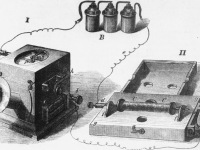Hedy Lamarr – a Hollywood Star Invents Secure Communication Technology
On November 9, 1913, Hollywood movie star Hedy Lamarr was born, co-inventor of an early form of the spread spectrum communication and frequency hopping, necessary for wireless communication from the pre-computer age to the present day. Hedy Lamarr – Family Background Ok, I assume that you are not necessarily familiar with spread spectrum communications technology. But, maybe you are wondering even more about a movie star diva of Hollywood’s Golden Age, who should be…
Read more











